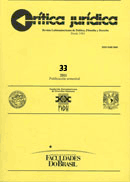Legal Pluralism, State and the Movement of Workers Without Land (MST) in Brazil
Main Article Content
Abstract
The objective of this paper it to analyze the Legal Pluralism that emerged due to the Movementof Rural Workers without Land (MST by its initials in Portuguese), in relation with the Brazilian State Law, verifying how these Laws (either the one of MST or the one upheld by the State), when they collide with each other, have been treated and evoked in the conflict solving instances. The hypothesis is that the experience of legal conflicts between MST and the State, because of it being a conflict between two significantly different forms of sociability and of Laws, manifests an important legal pluralization in the contemporary reality, and that this pluralization demands an adequate analytical and operational framework,in order to deal with such conflicts within this condition of Legal Pluralism. The emphasis lies inthe conflicts in which the issue “occupation versus property”, judged by the Brazilian state’s superior jurisdiction(Federal Regional Courts, Superior Court of Justice and Supreme Federal Court), even thougha surveying of state legal norms and public policies concerning agrarian issues of Brazil is also surveyed
Article Details
How to Cite
Albernaz, R. O., & Wolkmer, A. C. (2013). Legal Pluralism, State and the Movement of Workers Without Land (MST) in Brazil. Crítica Jurídica. Revista Latinoamericana De Política, Filosofía Y Derecho, (33). https://doi.org/10.22201/ceiich.01883968p.2012.33.35473


